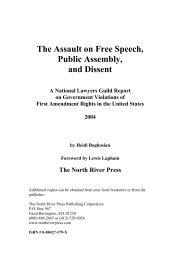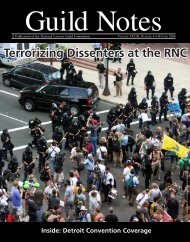<strong>Guild</strong> Notes ▪ Summer/Fall 2009D.C. Circuit rules checkpoints unconstitutionalby Andy ParkerOn July 10, a three-judge panel ofthe U.S. Court of Appeals, District ofColumbia Circuit unanimously ruledthat a police seizure and interrogationcheckpoint program begun one yearago in Washington D.C. is unconstitutional.The plaintiffs in this casewere represented by <strong>National</strong> <strong>Lawyers</strong><strong>Guild</strong> attorneys Mara Verheyden-Hilliard and Carl Messineo of theDC-based Partnership for Civil JusticeFund (PCJF).The D.C. Metropolitan PoliceDepartment authorized the so-called“Neighborhood Safety Zone” programin which police may barricade and sealoff entire neighborhoods in June 2008.They were first deployed in Trinidad, apredominantly African-American neighborhoodthat has been undergoing earlystages of gentrification.This ruling is particularly significantbecause the extraordinary D.C.checkpoint program was seen as apotential model for similar programsacross the country. Had it gone unchallenged,it is likely that it would havebeen greatly expanded and repeatedin jurisdictions throughout the UnitedStates.Police were authorized to surrounda targeted neighborhood using jerseybarriers or other barricades, and to“funnel” traffic through a checkpointentrance to the area. All vehicles werestopped and all motorists questioned, inthe absence of any reasonable suspicionthat the driver or vehicle had been engagedin criminal activity. Persons werethen not allowed to travel any furtherunless the police deemed that they had a“legitimate” reason for traveling on thepublic roadway.Officers required that persons disclosetheir destination, intended activitiesand names and contact informationof those they might be meeting withinthe neighborhood, including phonenumbers. Anyone refusing to providethis information was denied the right tocontinue on the public roadway into orthrough the neighborhood. Police wereto “verify” representations including bycontacting or phoning associates of themotorist whom the driver or passengercared to associate with.If a driver was unwilling to bequestioned by police, he or she was deniedentrance. If a driver in response tointerrogation presented a lawful reasonfor wanting to continue on the publicroadways into the neighborhood, he orshe would be denied entrance unless herpurpose was both “verified” by policeand fell within six restricted police-approvedcategories such as being a verifiableresident, or making a verifiablecommercial delivery.Visiting a friend was not deemeda legitimate purpose for driving intothe neighborhood. Nor was picking upgroceries. A person could only enter toengage in political activity or attend areligious service if she or he could andwas willing to disclose details of heractivities to the police, provide verifiedcontact information of associates, orprovide a printed invitation, after whichthe police were to decide whether theevent was a “verified” activity such thatthey would allow entry and participation.At oral argument, counsel for theDistrict of Columbia explained thatthese limited categories were intendedto detect or profile “persons inclinedtowards committing acts of violenceinvolving a motor vehicle.”When instituted, the program wasmet with strong opposition from withinthe community. Trinidad residents likenedit to “martial law.” The challengeto the program was a significant exampleof the effectiveness of a combinedpolitical and legal struggle. Membersof the ANSWER Coalition (Act Now toStop War & End Racism) were presentduring the checkpoint deployments andorganized with residents in grassrootsopposition to this police action throughdoor to door outreach, leafleting andmeetings.When the checkpoint programwas announced, D.C. Attorney GeneralDespite D.C. Attorney General Nickles’ heated rhetoricand public relations campaign trying to justify themassive civil rights violations, the MPD’s own statisticssubmitted to the Court showed that violent crimedoubled during the operation of the checkpoints.Peter J. Nickles claimed it was constitutional,saying, “I don’t anticipate us beingsued…But if you do want to sue us,the courts are open.” Four drivers acceptedthis challenge after being deniedpassage through the checkpoint becausethey refused to provide information andthey were represented by the PCJF. Oneof the drivers, William Robinson, wasa retired school teacher who had livedin Trinidad for over 50 years, since ithad been desegregated. Sadly, he passedaway before the Appeals Court ruled onhis case. Other plaintiffs included SarahSloan, a community organizer workingwith residents to oppose checkpoints,Linda Leaks, a local housing advocate,and Caneisha Mills, a Howard Universitystudent and hotel worker.Plaintiffs argued that the checkpointswere clearly prohibited under▪ 6 ▪
<strong>National</strong> Workthe 2000 Supreme Court ruling of Cityof Indianapolis v. Edwards, 531 U.S.32 (2000), which held that, generally,checkpoints instituted in the absenceof individualized suspicion and forthe purposes of general crime controlwere unconstitutional. The MPDcountered that Neighborhood SafetyZone checkpoints were not intended toresult in prosecution or arrest and thatthe purpose of protecting the neighborhoodby deterring criminal activity andfencing out potential criminals placedthe checkpoints outside the scope ofEdwards.The PCJF argued in its briefingthat, “If police could use the existenceof crime to justify suspension of constitutionalprotections, there would be noConstitution left to speak of.”Not only was the program unconstitutional,it was also ineffective.Despite D.C. Attorney GeneralNickles’ heated rhetoric and publicrelations campaign trying to justifythe massive civil rights violations,the MPD’s own statistics submitted tothe Court showed that violent crimedoubled during the operation of thecheckpoints.Nonetheless, United States DistrictJudge Richard J. Leon agreedwith the MPD and denied plaintiffs’motion for a preliminary injunction.The PCJF, filed an interlocutory appealand took the fight to the U.S. Court ofAppeals.On July 10, 2009, Chief JudgeDavid B. Sentelle, a Reagan appointee,on behalf of a unanimous panelissued a strongly-worded opinionin favor of the plaintiffs. The Courtfound that “the harm to the rights ofappellants is apparent.” The Courtfound the Neighborhood Safety Zoneprogram violated persons’ FourthAmendment rights, and that “citizenshave a right to drive upon the publicstreets of the District of Columbia orany other city absent a constitutionallysound reason for limiting theiraccess.”Checkpoints like this one in Washington, D.C. were ruled unconstitutional in July thanksto the work of the Partnership for Civil Justice. Photo by Roger Scott.The Court of Appeals reversed thelower court’s denial of plaintiffs’ motionfor a preliminary injunction, findingthat “[t]hey have made a particularlystrong showing of the substantiallikelihood of success on the meritsand that they would suffer irreparableinjury if the injunction is not granted.”See Mills v. District of Columbia, No.08-7127 (D.C. Cir., July 10, 2009).The Court added, “It is apparent thatappellants’ constitutional rights areviolated.”The day before the PCJF filedsuit, D.C. Police Chief Cathy Lanierannounced that she would continueto impose the seizure and interrogationcheckpoint program “until a judgeorders me to stop.” That day has, quitedecisively, come. □CLE at Convention toAddress CheckpointsIssuesSeattle Plus 10: LitigationSkills Training for UniqueIssues in ConstitutionalRights Protest CasesWednesdayOctober 14, 20091-5 pmFor information onenrollment, contact:Mara Verheyden-Hilliardat mvh@justiceonline.orgor visitwww.nlg.org/convention.▪ 7 ▪


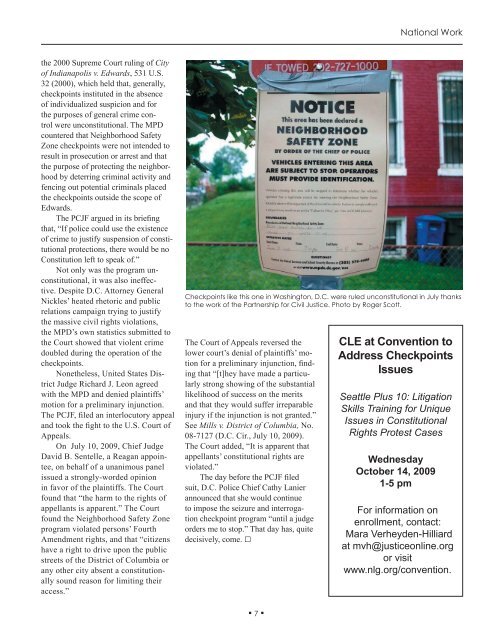
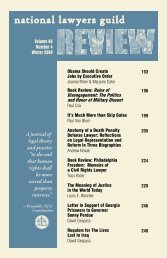
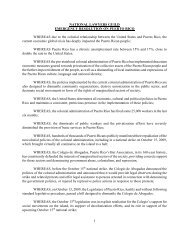
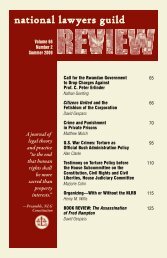
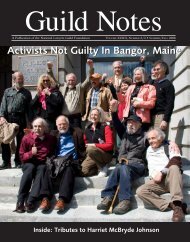
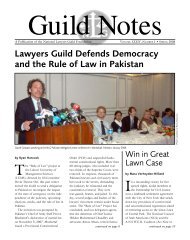
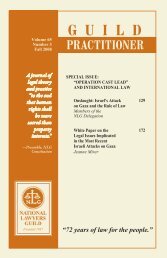

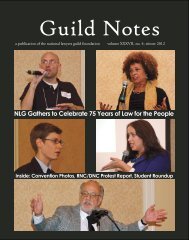
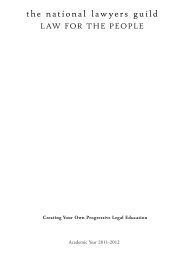
![NLGRev 68-2[1].indd - National Lawyers Guild](https://img.yumpu.com/30820772/1/167x260/nlgrev-68-21indd-national-lawyers-guild.jpg?quality=85)
